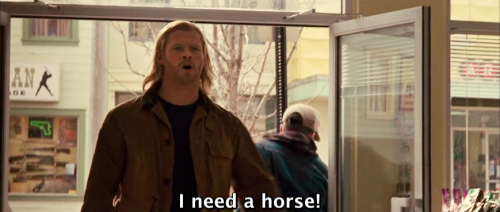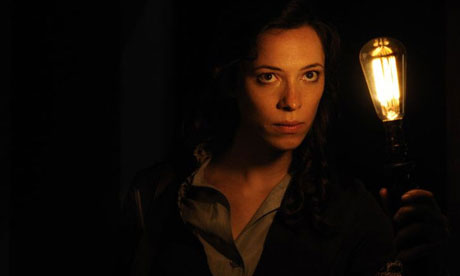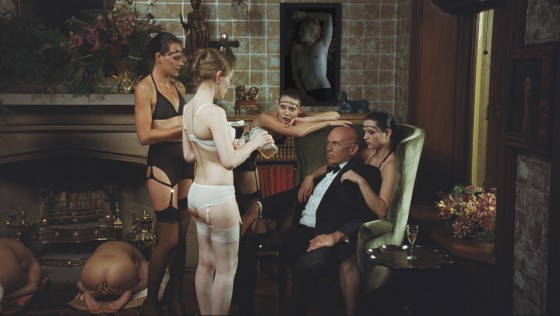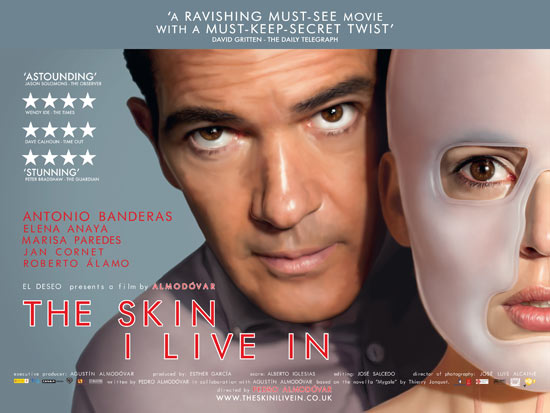Another year behind us... I've been looking through all the reviews from 2011 and I have to say, this was one good year for cinema. I actually struggled to decide which ones to keep in the top 10 list, so in order to filter my selection, I thought about whether I'd watch any of the films again (choosing the top 3 was a no-brainer). To make things a little easier I decided to go by genre, so each film in the selection represents a particular type of movie. Also, the films I chose have all come out in the UK and Belgium (where I watch most films) in 2011, although, of course, this varies across other countries.
Anyways, hope you enjoy reading this and get inspired to watch some of these wonderful films.
10. Thor. Dir.: Kenneth Branagh. With: Chris Hemsworth, Natalie Portman
There were so many superhero films out this year, but for me, 'Thor' stands out by virtue of its undiluted self-mockery. It does not take the whole mythology and the hero himself too seriously and manages to produce a very decent a-wildling-in-a-modern-town type of movie, much in the style of 'Crocodile Dundee', 'The Visitors' and 'Blast from the Past'. The casting was very good but the best actor was Tom Hiddleston as Loki....I see a big future for this man. Full review can be read here.
Favourite moment: Thor looking for a ride.
9. Potiche. Dir.: Francois Ozon. With: Catherine Deneuve, Gerard Depardieu
From superheroes to a bit of French charm. Deneuve and Depardieu re-unite in this romance for the elderly set in the 70s France. He is an old communist and she is a trophy wife of a rich factory-owner. Their onscreen chemistry is an absolute pleasure to behold. The movie is funny, slightly kitschy and has certain dark overtones; nevertheless, it is a very French romantic comedy in the purest sense. Full review can be read here.
Favourite moment: Catherine's revelations about what a naughty girl she used to be back in the day.
8. Midnight in Paris. Dir.: Woody Allen. With: Owen Wilson et al.
Staying in the same location but changing the period. Or, rather, periods. This was Woody Allen's highest-grossing film ever. EVER. If this does not impress you then maybe this will - I've been listening to the soundtrack from the film for months on end after watching the movie. Still not impressed? Well, it also features half of the acting world, portraying various famous artists, writers and thinkers of the Parisian boutiques from the 1920s. And one of them delivers the best line about art: artists should not be defeatist about life, their job is to offer a way of coping with it. Full review - here.
Favourite moment: Salvador Dali.
7. Pina. Dir.: Wim Wenders.
This year was also quite big for documentaries but nothing compares in its sublime beauty to 'Pina', a film commemorating the life and work of Pina Bausch, a German choreographer. It presents some of the most celebrated dance performances by her Tanztheater and the dancers' memories of her. The 90 minutes flew by like five; I cannot find the words to describe how ephemeral, beautiful and moving this film is. The plasticity of the human body does not fail to astonish from one piece to the next. Full review - here.
Favourite moment: this.
6. Drive. Dir.: Nicolas Winding Refn. With: Ryan Gosling, Carrey Mulligan.
The following four things should be enough to make anyone go and watch this - Ryan Gosling feeling the need, the need for speed; double-denim a-la Steve McQueen; armed robberies gone wrong; and a theme tune by Kavinsky. Full review - here.
Favourite moment: Driver's scorpio jacket.
5. The Adventures of Tintin: The Secret of the Unicorn. Dir.: Steven Spielberg. With: Jamie Bell, Andy Serkis.
Since I am a self-professed connoisseur of children's films, I can say with full confidence that 'Tintin' was an absolute marvel of a film. I mean, it does not happen every day that you have a Scottish alcoholic as the protagonist of a PG animation. I don't mean Tintin of course, but rather his friend, Captain Haddock, brilliantly voiced by Andy Serkis. The film was a feast for the eyes and imaginations, it was funny, crude, exciting and deliciously mad. You could get a real sense of adventure and for the first time ever I thought that a movie really benefited from being shot in 3D. I didn't actually write a review, but believe you me - it deserves to be watched and I cannot wait for more!
Favourite moment: The chase through the town of Bagghar.
4. 127 Hours. Dir.: Danny Boyle. With.: James Franco.
This mock-documentary set in the beautiful mountains of Utah stayed with me for a long time after I watched it. It is a brilliant presentation of a human being's reactions to a seemingly hopeless situation, his resourcefulness and an endless amount of courage. I was moved, disturbed and carried away by this film. James Franco's performance was one of best this year. Full review here.
Favourite moment: The talkshow scene.
3. The Tree of Life. Dir.: Terrence Malick. With: Brad Pitt, Jessica Chastain.
This was the longest, slowest, weirdest and one of the most intriguing and beautiful films I have ever seen. It was curiously engaging and somehow I found myself completely entangled in the little family drama of the O'Briens. The eldest son, Jack, goes through what some may call an existential crisis at a very tender age; it is a treat to watch how this forms his character in the future. This is one amazing psychological study of life, death, childhood and family bonds coupled with an enchanting soundtrack. Full review - here.
Favourite moment: Jack admiring a neighbour's silk nightdress and stealing it.
2. The Skin I Live In. Dir.: Pedro Almodovar. With: Elena Anaya, Antonio Banderas.
Wawawiwa. This was one crazy cocktail of mystery, obsession, revenge and sexual deviance with an incredible twist right at the end - basically, everything I want from a movie. Especially, a movie by Almodovar, who is probably the best director of women's stories. Everything in it is designed to mislead the viewer, nothing is what it seems: the beautiful landscape of Toledo, the lavish villa, the artwork - they play the roles of witnesses to a horrible crime. But wait, what crime? Was there a crime? And if yes, then who is the victim? Dun-dun-dun....Full review - here.
Favourite moment: well, apart from the AHA! moment in the end of the film which I shan't disclose here, my favourite moment is being introduced to Vera for the first time through the eyes of Dr Ledgard.
And the winner is.....
1. The Artist. Dir.: Michel Hazanavicius. With: Jean Dujardin, Berenice Bejo.
The only silent film out this year, 'The Artist' obviously had to be included. But it is not its originality, charming as it is, that makes it my favorite film of 2011, but its joyous message and the all-encompassing love of films and filmmaking that runs like a red thread through the whole movie. This film has the heart and soul of the old Hollywood romances like 'The Roman Holiday' and its three stars, including Uggie the dog, will become iconic characters in the years to come, I am sure of it. 'The Artist' will make you howl with laughter and wipe your tears away and you'll be smiling for a week after leaving the cinema. I am also really pleased to remind you that it is coming out on the 30th of December in the UK, so go with your friends and family - this film transcends generations. Full review - here.
Favourite moment: George Valentin's nightmare.
Anyways, hope you enjoy reading this and get inspired to watch some of these wonderful films.
10. Thor. Dir.: Kenneth Branagh. With: Chris Hemsworth, Natalie Portman
There were so many superhero films out this year, but for me, 'Thor' stands out by virtue of its undiluted self-mockery. It does not take the whole mythology and the hero himself too seriously and manages to produce a very decent a-wildling-in-a-modern-town type of movie, much in the style of 'Crocodile Dundee', 'The Visitors' and 'Blast from the Past'. The casting was very good but the best actor was Tom Hiddleston as Loki....I see a big future for this man. Full review can be read here.
Favourite moment: Thor looking for a ride.
9. Potiche. Dir.: Francois Ozon. With: Catherine Deneuve, Gerard Depardieu
From superheroes to a bit of French charm. Deneuve and Depardieu re-unite in this romance for the elderly set in the 70s France. He is an old communist and she is a trophy wife of a rich factory-owner. Their onscreen chemistry is an absolute pleasure to behold. The movie is funny, slightly kitschy and has certain dark overtones; nevertheless, it is a very French romantic comedy in the purest sense. Full review can be read here.
Favourite moment: Catherine's revelations about what a naughty girl she used to be back in the day.
8. Midnight in Paris. Dir.: Woody Allen. With: Owen Wilson et al.
Staying in the same location but changing the period. Or, rather, periods. This was Woody Allen's highest-grossing film ever. EVER. If this does not impress you then maybe this will - I've been listening to the soundtrack from the film for months on end after watching the movie. Still not impressed? Well, it also features half of the acting world, portraying various famous artists, writers and thinkers of the Parisian boutiques from the 1920s. And one of them delivers the best line about art: artists should not be defeatist about life, their job is to offer a way of coping with it. Full review - here.
Favourite moment: Salvador Dali.
7. Pina. Dir.: Wim Wenders.
This year was also quite big for documentaries but nothing compares in its sublime beauty to 'Pina', a film commemorating the life and work of Pina Bausch, a German choreographer. It presents some of the most celebrated dance performances by her Tanztheater and the dancers' memories of her. The 90 minutes flew by like five; I cannot find the words to describe how ephemeral, beautiful and moving this film is. The plasticity of the human body does not fail to astonish from one piece to the next. Full review - here.
Favourite moment: this.
6. Drive. Dir.: Nicolas Winding Refn. With: Ryan Gosling, Carrey Mulligan.
The following four things should be enough to make anyone go and watch this - Ryan Gosling feeling the need, the need for speed; double-denim a-la Steve McQueen; armed robberies gone wrong; and a theme tune by Kavinsky. Full review - here.
Favourite moment: Driver's scorpio jacket.
5. The Adventures of Tintin: The Secret of the Unicorn. Dir.: Steven Spielberg. With: Jamie Bell, Andy Serkis.
Since I am a self-professed connoisseur of children's films, I can say with full confidence that 'Tintin' was an absolute marvel of a film. I mean, it does not happen every day that you have a Scottish alcoholic as the protagonist of a PG animation. I don't mean Tintin of course, but rather his friend, Captain Haddock, brilliantly voiced by Andy Serkis. The film was a feast for the eyes and imaginations, it was funny, crude, exciting and deliciously mad. You could get a real sense of adventure and for the first time ever I thought that a movie really benefited from being shot in 3D. I didn't actually write a review, but believe you me - it deserves to be watched and I cannot wait for more!
Favourite moment: The chase through the town of Bagghar.
4. 127 Hours. Dir.: Danny Boyle. With.: James Franco.
This mock-documentary set in the beautiful mountains of Utah stayed with me for a long time after I watched it. It is a brilliant presentation of a human being's reactions to a seemingly hopeless situation, his resourcefulness and an endless amount of courage. I was moved, disturbed and carried away by this film. James Franco's performance was one of best this year. Full review here.
Favourite moment: The talkshow scene.
3. The Tree of Life. Dir.: Terrence Malick. With: Brad Pitt, Jessica Chastain.
This was the longest, slowest, weirdest and one of the most intriguing and beautiful films I have ever seen. It was curiously engaging and somehow I found myself completely entangled in the little family drama of the O'Briens. The eldest son, Jack, goes through what some may call an existential crisis at a very tender age; it is a treat to watch how this forms his character in the future. This is one amazing psychological study of life, death, childhood and family bonds coupled with an enchanting soundtrack. Full review - here.
Favourite moment: Jack admiring a neighbour's silk nightdress and stealing it.
2. The Skin I Live In. Dir.: Pedro Almodovar. With: Elena Anaya, Antonio Banderas.
Wawawiwa. This was one crazy cocktail of mystery, obsession, revenge and sexual deviance with an incredible twist right at the end - basically, everything I want from a movie. Especially, a movie by Almodovar, who is probably the best director of women's stories. Everything in it is designed to mislead the viewer, nothing is what it seems: the beautiful landscape of Toledo, the lavish villa, the artwork - they play the roles of witnesses to a horrible crime. But wait, what crime? Was there a crime? And if yes, then who is the victim? Dun-dun-dun....Full review - here.
Favourite moment: well, apart from the AHA! moment in the end of the film which I shan't disclose here, my favourite moment is being introduced to Vera for the first time through the eyes of Dr Ledgard.
And the winner is.....
1. The Artist. Dir.: Michel Hazanavicius. With: Jean Dujardin, Berenice Bejo.
The only silent film out this year, 'The Artist' obviously had to be included. But it is not its originality, charming as it is, that makes it my favorite film of 2011, but its joyous message and the all-encompassing love of films and filmmaking that runs like a red thread through the whole movie. This film has the heart and soul of the old Hollywood romances like 'The Roman Holiday' and its three stars, including Uggie the dog, will become iconic characters in the years to come, I am sure of it. 'The Artist' will make you howl with laughter and wipe your tears away and you'll be smiling for a week after leaving the cinema. I am also really pleased to remind you that it is coming out on the 30th of December in the UK, so go with your friends and family - this film transcends generations. Full review - here.
Favourite moment: George Valentin's nightmare.
Happy New Year to you all!!!

































